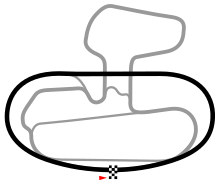Race report
Two hundred laps took place on an oval track spanning 2.0 miles (3.2 km). [2] Darrell Waltrip won the race; beating Bobby Allison by 60 seconds. [2] Eleven thousand and five hundred fans would attend this live race with lasted more than two hours and thirty-three minutes; making it the least attended race in NASCAR's modern era even when comparing races from after the 2008 NASCAR Sprint Cup Series season. [2] Waltrip's overall speed for the race was 156.216 miles per hour (251.405 km/h) while Buddy Baker achieved the pole position for the race with a speed of 167.903 miles per hour (270.214 km/h). [2] Total winnings for this race were $161,250 ($676,939.48 when considering inflation); Darrell would receive $21,750 of the total purse ($91,308.12 when considering inflation).
Dale Earnhardt was Waltrip's top challenger before he crashed late in the race. Waltrip had a lap lead but Allison, Baker, and Yarborough had a one-lap dash for second. Allison got second by about two feet over Baker, who was about four feet back. [2] Some of the more notable names to make an appearance here were: Dale Earnhardt, Richard Childress, Cale Yarborough, Terry Labonte, Richard Petty, and J. D. McDuffie. [2]
Notable crew chiefs in attendance for this race were Buddy Parrott, Joey Arrington, Kirk Shelmerdine, Darrell Bryant, Dale Inman, Bud Moore, Tim Brewer, and Jake Elder. [3]
While Jim Hurlbert and John Rezek would make their NASCAR Cup Series debut, Billy Hagan would make his grand exit after this race along with three other drivers. Bill Meazel would make his only NASCAR appearance during this event. [4]
Qualifying
| Grid | | Driver | Manufacturer |
|---|
| 1 | 28 | Buddy Baker | Chevrolet |
|---|
| 2 | 44 | Terry Labonte | Chevrolet |
|---|
| 3 | 2 | Dale Earnhardt | Chevrolet |
|---|
| 4 | 88 | Darrell Waltrip | Chevrolet |
|---|
| 5 | 11 | Cale Yarborough | Chevrolet |
|---|
| 6 | 15 | Bobby Allison | Ford |
|---|
| 7 | 90 | Ricky Rudd | Mercury |
|---|
| 8 | 27 | Benny Parsons | Chevrolet |
|---|
| 9 | 43 | Richard Petty | Chevrolet |
|---|
| 10 | 72 | Joe Millikan | Chevrolet |
|---|
| 11 | 12 | Lennie Pond | Chevrolet |
|---|
| 12 | 40 | D.K. Ulrich | Buick |
|---|
| 13 | 50 | Bruce Hill | Buick |
|---|
| 14 | 64 | Tommy Gale | Ford |
|---|
| 15 | 25 | Ronnie Thomas | Chevrolet |
|---|
| 16 | 48 | James Hylton | Chevrolet |
|---|
| 17 | 67 | Buddy Arrington | Dodge |
|---|
| 18 | 79 | Frank Warren | Dodge |
|---|
| 19 | 3 | Richard Childress | Oldsmobile |
|---|
| 20 | 45 | Baxter Price | Chevrolet |
|---|
| 21 | 70 | J.D. McDuffie | Chevrolet |
|---|
| 22 | 19 | Billy Hagan | Chevrolet |
|---|
| 23 | 52 | Jimmy Means | Chevrolet |
|---|
| 24 | 31 | John Rezek | Oldsmobile |
|---|
| 25 | 36 | H.B. Bailey | Pontiac |
|---|
This page is based on this
Wikipedia article Text is available under the
CC BY-SA 4.0 license; additional terms may apply.
Images, videos and audio are available under their respective licenses.
